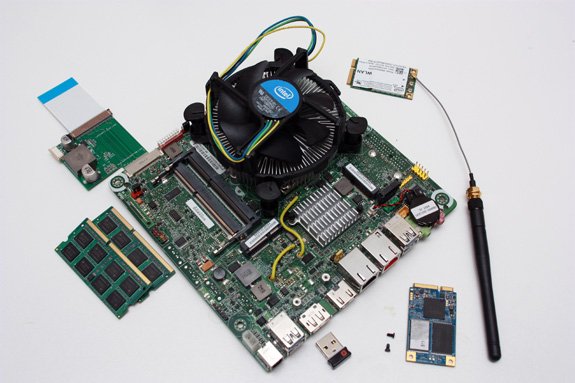This year, he has beaten his own records one more time. The newest prototype requires only 5.9W in idle mode, and 74.5W when fully operational. Of all the world’s known x86 computers, there is none that can boast these levels of efficiency (though bear in mind that Mux’s model has yet to be commercialised).
Codenamed Fluffy2, the system features the Intel DQ77KB motherboard, the Intel Core i5-3750K processor, 16GB DDR3 memory, WLAN and a 64GB SSD. A discrete graphics card isn't included because Mux feels that these use too much power, and because today's integrated graphics are good enough to play modern games at low quality settings.
By default, the hardware configuration he assembled uses 11.6W in idle, to get this down to 5.9W he undervolted the processor and analyzed the flow of power around the motherboard to make several mods to increase the system's energy efficiency. Mux voltmodded the processor, and desoldered the PCI Express slot, a fan header, SATA ports, and a LED to further enhance energy efficiency.

It is a genuine Guinness World Record, standing in idle mode five times the level of efficiency of an average computer. It is twice as efficient in operational mode. Improvements in idle mode efficiency may, at first glance, seem insignificant, but this is, in fact, how, computers burn about 70 percent of their daily energy. Less than a third of a computer’s consumption of electricity is used for hands-on tasks.
Fortunately, computers are already among the most efficient electronic tools in our daily lives. Even if they’re left on all day, they still consume less electricity than appliances like washing machines or electrical ovens. Furthermore, the computer market evolves at a rapid rate, even in the area of eco-technology. Modern all in one computers now not only include all the functions of traditional desk-bound PCs, they are also more efficient. By integrating various components (including the screen) into one single piece, they reduce the amount of running hardware, and therefore the power required.
Mux's goal is to turn Fluffy2 into an all-in-one desktop that uses just 20W in idle. He plans to incorporate the 5.9W computer system into a passively cooled enclosure that houses an IPS LCD display with a power consumption of less than 10W, and some UPS batteries to be able to keep working in case of a power outage, or if he wants to take the system to another room.
Mux’s concern is less with the efficiency of individual computers themselves, than with their numbers. Computers are so popular, and are owned by so many families, that even with such low demands on consumption they can still use up a great deal of a country’s total electricity supply. Hence, the production of this new prototype that aims to lower the collective impact of these machines. Were it to be commercialised, it could indeed plausibly achieve this goal. After all, Mux has been working with spare parts of existing computers, to produce these prototypes, so they would be no more expensive to produce than other models already in the market.
Even if Mux’s prototypes were not to be commercialised directly, they would still be driving the industry forward, and this is how progress is made. His new technologies are still likely to be gradually integrated into existing models, as they have been previously. Even without his innovations, the computers of the future would be expected to break efficiency records. Just this way, it might not be at the environment’s expense.
- This is a guest post by Natalie Smith